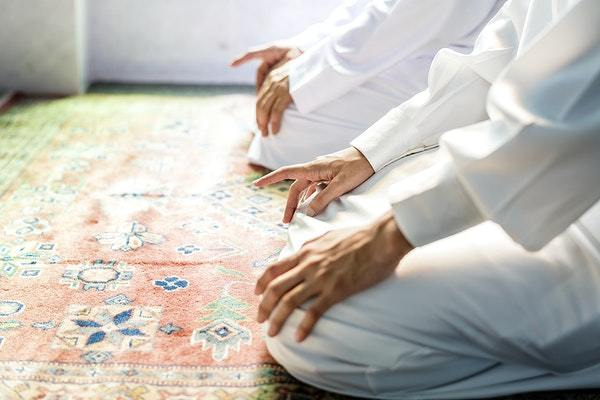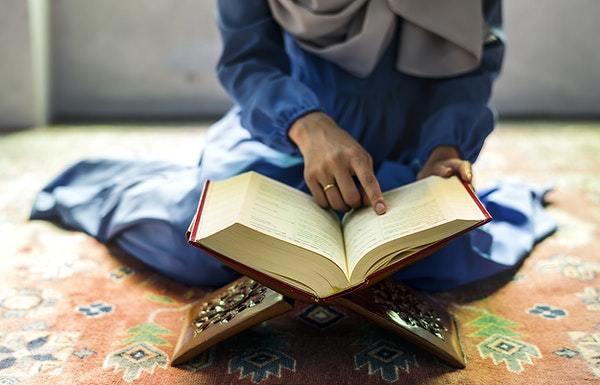Developing Better Salah (Prayer) Habits – How to Find a Deeper Meaning & Stronger Connection
Faith
|
Apr 20, 2020
|
6 MIN READ

By Danah Shuli
It’s been a month since most of us in North America (and around the world) have hunkered down in our homes as the coronavirus pandemic continues to spread. By now, I think we have all come to terms with the fact that our mosques will remain closed for a little while longer, and Ramadan this year is going to be different than any other we’ve experienced before.
Many of us look forward to Ramadan as a time of spiritual renewal – whether it’s starting new habits of worship or revisiting ones that we have abandoned for one reason or another. During this time of solitude, I personally have found salah very grounding and a means of comfort. I previously wrote a piece on how to create prayer spaces and worship practices while our mosques are closed. Having a dedicated space to pray can set an optimal mood, but often the harder thing for us is finding khushoo (meaning) in our prayer, or perhaps coming back to it when we haven’t been regular in our five daily prayers for awhile.
There is no time like the present to ponder on the state of our iman and implement positive change in the way we worship. As Muslims, we believe that there is good in everything Allah (S) has decreed, whether we see it or not. This pandemic has brought much of the world to a halt; more than two million around the world have/had COVID-19, and nearly 170,000 have died. It has tested people in ways they never thought imaginable.
It has also given us time to reflect and ponder and to be thankful for the blessings we may have taken for granted. Staying at home has given us the gift of time – to pray that extra sunnah prayer that we may have otherwise skipped in order to catch our next meeting, or to ponder the verses we are reading during salah instead of merely reciting from memory. It has given us time to consciously take in every movement of salah instead of routinely going through the actions to check off another prayer of the day.
So, with Ramadan nearly upon us, let’s talk about how to strengthen khushoo in prayer as well as how to form better habits around salah, especially if you’ve strayed away from it.

Reestablishing Your Connection with Allah (S)
The first step in finding meaning in prayer or going back to it is reminding yourself that Allah (S) is there for us no matter how far we’ve strayed. All we have to do is ask Him for forgiveness. The Quran says:
And when My servants ask you, [O Muhammad], concerning Me – indeed I am near. I respond to the invocation of the supplicant when he calls upon Me. So let them respond to Me [by obedience] and believe in Me that they may be [rightly] guided. [2:186]
The concept of repentance and going back to Allah (S) is an integral part of our deen. We were not created perfect, nor are we expected to be perfect. Allah (S) is merciful, and He created us as humans knowing that we will sin and find our way back to him through du’a and prayer.
This time of isolation is the perfect opportunity for us to ponder on our existence, our purpose in this life. Allah (S) says numerous times in the Quran that this life is nothing but a distraction, and our true purpose of existence is to worship Him and serve Him. It’s never too late to reestablish your connection with Allah (S) no matter where you are in your spiritual journey. You are worthy of His mercy and repentance; all you have to do is ask for it.
Small Steps Go a Long Way
No matter where you are in your worship, getting closer to Allah (S) is a process that takes time and sincerity. If you’ve never performed the five daily prayers (or haven’t done so in a while), you can’t expect to jump out of bed one day and start praying them all. Similarly, if you don’t usually pray your sunnah before and after the obligatory prayers, you probably won’t start doing so all of a sudden.
Small consistent acts of worship are more favorable to Allah (S), and more sustaining, than sudden bursts of worship. Start by adding one extra prayer to your daily routine. Perfect it by making sure you have wudu. Physically prepare a serene prayer space and renew your intentions. Ask Allah (S) to help you achieve your goal, and work hard by continuously following through with your salah. Maybe you need to set an alarm on your phone or enable notifications on your prayer app to act as a reminder.
Gradually add an extra prayer into your routine. With the right mindset and intention, Allah (S) will help you achieve your goals even when they seem impossible.
Abu Huraira reported:
The Messenger of Allah, peace and blessings be upon him, said, “Take up good deeds only as much as you are able, for the best deeds are those done regularly even if they are few.” Source: Sunan Ibn Mājah 4240
Reflect on the Verses You Recite
Something I’ve taken up recently – in light of current events and social distancing – is taking time out of my day to contemplate and reflect deeply on the words of Allah (S) that I recite in my daily prayers. In order to have khushoo in prayer, I think it’s crucial to truly understand the meaning behind the words you are reciting. Two great resources for Quran translation are “The Meaning of the Holy Qur’an in Today’s English” by Yahiya Emerick and “The Study Quran” by Seyyed Hossein Nasr.
The Qalam Institute offers this great class as well, "Meaningful Prayer," that focuses on understanding the language of salah and how to connect with it on a deeper level. (It does cost $85.)

Not only will taking the time to understand what you are reciting build a stronger connection between you and Allah (S) through prayer, but it will also allow you to ponder the Quran more deeply outside of prayer. Praying can become routine to many of us or a “to-do” that we want to check off our list, when in reality it should be a time of reconnection and reflection.
A dear friend of mine who I interviewed for Haute Hijab, Samia Mubarak, is an ocean of knowledge when it comes to this. She has recently started her own YouTube channel and Instagram account (@quranic_ocean) where she shares daily Quranic gems. (She also does this on her blog.) Samia deciphers verses in the Quran to help her audience grasp a deeper understanding of the words of Allah (S) as well as appreciate the wisdom that is carefully placed in each and every word.
Build a Buddy System
We are blessed to live in a day and age of technology. Use that technology to your advantage in helping you become more regular and consistent in your prayers, especially if there is one you seem to always miss! Contact a close friend or family member and encourage them to be your prayer buddy. Call each other to wake up for fajr or tahajud. Schedule video calls where you both share your insights on pre-picked verses. Don’t make it overbearing; keep it light and simple – one to two ayahs a week.
In my weekly halaqa (study) group, some of my peers have started a tahajud circle where participants call each other to wake up and pray some rakats before fajr. With a toddler and baby, I personally haven’t had the chance to participate just yet, but I can see the enthusiasm of those who participate in the group and the iman-rush it gives them to know they are all doing an act of worship together, even if they are physically apart.
There is something contagious about encouraging others to perform acts of worship. It not only keeps you accountable but also makes you feel like you are not alone in this.
Something that I have picked up personally is joining a virtual morning dhikr call. I’ve talked previously about creating a strong morning routine that includes staying up after fajr. Granted, I am a morning person by nature. Joining a virtual dhikr call, especially during this time of uncertainty and isolation, has proven to be immensely powerful and grounding for me. It has also helped me build a sense of community as I try to navigate this season of my life.
Of course there are some days where I do not make the call, but I can confidently say that the days in which I join are always a lot more productive and smooth. There is added barakah in circles of God’s remembrance!
Salah doesn't have to be a burden but rather a refuge and means of getting closer to Allah (S) in times of uncertainty. Remember that small consistent acts of worship are most favorable to Allah (S). By doing this you are not only reaping the benefits alone, you are getting the ajr of encouraging a loved one to take part in this spiritual journey with you. You just never know, they might have needed the nudge more than you did!
Subscribe to be the first to know about new product releases, styling ideas and more.
What products are you interested in?

